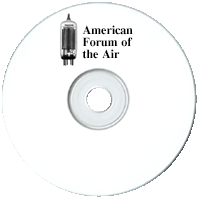

One of the first Public Affairs Panel Discussion Programs, American Forum of the Air presented an often lively debate of National Issues.

28 old time radio show recordings
(total playtime 14 hours, 3 min)
available in the following formats:
1 MP3 CD
or
15 Audio CDs
Text on OTRCAT.com ©2001-2025 OTRCAT INC All Rights Reserved. Reproduction is prohibited.
One reason that Radio became a dominant form of media in the Twentieth Century was that broadcasting relied on a relatively simple and accessible technology. An ambitious and knowledgeable operator could make his own serviceable broadcasting equipment, although there were several industrial manufacturers which built broadcasting gear for professionals. This was not cheap, but relatively affordable.

A government-supported broadcast needs to satisfy the State's desires while a commercial broadcast has to attract listeners or it will come "unprofitable" and be taken off the air. However, because broadcasting licenses are issued by the Government, commercial broadcasters have a mandate to "serve the public interest". Serving the public interest can take several forms, although it generally needs to be entertaining and relevant enough to keep listeners from changing their dial settings.
One of the first public affairs panel discussion programs was Then American Forum of the Air, created and hosted by Brooklyn-born attorney Theodore Granik. While working his way through night school at St. John's University Law School, Granik was employed as a copywriter and sports reporter for WGBS New York, the station belonging to Gimbel's Department Store. Fascinated by his studies, Granik managed to convince the station manager to create Law for the Layman in 1928. The show enjoyed the support of the Law School, and several members of the St. John's faculty appeared on the air.
WGBS was bought by the Hearst Syndicate in 1932, and Granik moved on to WOR, which was in the process of becoming the flagship of the then-forming Mutual Network. The program went on quietly until an on-air debate between Representative Emmanuel Cellar of Brooklyn and Mrs. Elia Boole, president of the Woman's Christian Temperance Union; the subject was Prohibition. The debate soon became heated, and Mutual was delighted enough with the response to approve a series of radio forums built around a debate format. The American Forum was born.
Although 'Forum had found a permanent home on the Mutual Network, the Network was unwilling to pay for more than production expenses. A salary for Ted Granik was out of the question. Fortunately, he had earned his law degree in 1929 and hung his shingle in Brooklyn for a time before a four-year stint as New York Assistant District Attorney. The show moved to Washington DC when Granik accepted a posting as Special Counsel to the Federal Housing Authority. In 1941, he became an Advisor to Brig. General Hershey of the Selective Service Administration and in 1942 began serving with the Chairman of the War Production Board.
During his Washington stay, Granik used his connections to find guests for the program. At first, he found that Congressmen were reluctant to appear, but thanks to the show's national reach, House members soon saw a huge mail response to their appearances. Guests include Senator Harry Truman, N.Y. Governor Franklin Roosevelt, N.Y.C. Mayor LaGuardia, and many other political movers and shakers.
The American Forum of the Air stuck to a rather rigid format. The debaters were allowed to make opening statements, followed by a panel discussion of the issues. An audience Question and Answer period and closing remarks wrapped the broadcasts. Transcripts of the often lively debates were published in The Congressional Record.
The show was adapted for NBC TV in 1949 and continued on NBC Radio until March of 1956. At the time of his death from a heart attack in 1970, Theodore Granik had purchased WGSP-TV in Washington and was planning a return to the public affairs panel discussion program format that had made him famous.
See also: University of Chicago Roundtable, CBS World News Today, Democracy in America, Speaking of Liberty and Living in an Atomic Age with philosopher, Sir Bertrand Russel, and I Can Hear it Now (Edward R. Murrow).
Text on OTRCAT.com ©2001-2025 OTRCAT INC All Rights Reserved. Reproduction is prohibited.
You have reached the maximum number of votes for a unregistered user.
Please login or create a new account to continue...
You have reached the maximum number to down votes in this page.



American Forum of the Air Disc A001
|
Add Audio CD to Cart - $5.00 |
American Forum of the Air Disc A002
|
Add Audio CD to Cart - $5.00 |
American Forum of the Air Disc A003
|
Add Audio CD to Cart - $5.00 |
American Forum of the Air Disc A004
|
Add Audio CD to Cart - $5.00 |
American Forum of the Air Disc A005
|
Add Audio CD to Cart - $5.00 |
American Forum of the Air Disc A006
|
Add Audio CD to Cart - $5.00 |
American Forum of the Air Disc A007
|
Add Audio CD to Cart - $5.00 |
American Forum of the Air Disc A008
|
Add Audio CD to Cart - $5.00 |
American Forum of the Air Disc A009
|
Add Audio CD to Cart - $5.00 |
American Forum of the Air Disc A010
|
Add Audio CD to Cart - $5.00 |
American Forum of the Air Disc A011
|
Add Audio CD to Cart - $5.00 |
American Forum of the Air Disc A012
|
Add Audio CD to Cart - $5.00 |
American Forum of the Air Disc A013
|
Add Audio CD to Cart - $5.00 |
American Forum of the Air Disc A014
|
Add Audio CD to Cart - $5.00 |
American Forum of the Air Disc A015
|
Add Audio CD to Cart - $5.00 |
Please wait...
COMMENTS
Be the first to comment on "American Forum of the Air"
Leave a comment